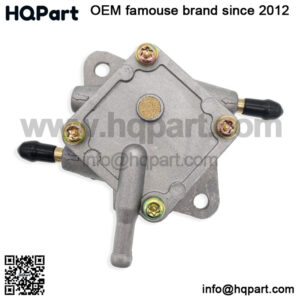What is a fuel pump?
The fuel pump is a vital part of your vehicle’s mechanics that sends the gas in the tank through the fuel system and into the engine. During this process, the gasoline passes through a fuel filter into the fuel injectors and then combusts inside the cylinders.
Without a pump, gasoline would have no way of reaching the engine, and the pistons without enough fuel to provide power to the driveline.
On older vehicles, mechanical fuel pumps use plungers or diaphragms to transport fuel to the carburetor, which then sprays it into the cylinders.
But on modern vehicles with electronic fuel injection systems needing higher fuel pressure, electric fuel pumps are more suited to the task. Modern cars usually have electric fuel pumps mounted inside the gas tank and powered by a DC electric motor. Electric fuel pumps also reduce fire risk because they’re covered in cool gasoline and installed far from the engine.
A fuel pump delivers gasoline, the cost of which can add up the more you drive. If you’re considering a pre-owned electric car or hybrid to lessen your expenses, where can you find one in excellent condition at a great price? Shift’s certified mechanics perform extensive 150-point inspections on every car and have complete vehicle history reports, so you know your used car feels as good as new. And Shift offers fair, no-haggle prices driven by powerful machine-learning algorithms and tons of data, taking the stress out of car buying and negotiation with our no-pressure sales environment.
Shift’s website has a large selection of fully inspected cars located across the country that are ready to go. The website is user-friendly, and you’ll be able to find various makes and models to suit your needs and budget. Want to take a test drive before you buy? If you live in one of Shift’s many service areas, a concierge will drive to you, letting you get a feel for the performance before signing the papers.
Fuel pump cost to replace
With the variety of vehicles on the road today, the cost to replace a fuel pump covers a wide range.
From a basic, economical four-cylinder engine to a turbocharged V8 designed for performance, replacing the fuel pump can run from a couple of hundred dollars to more than a thousand.
The average cost to replace a fuel pump is currently between $220 and $1,062, depending on the make, model, and year of manufacture.
Symptoms of a bad fuel pump
1. Engine runs poorly
If you’ve owned your vehicle for several years or have experience behind the wheel in general, you probably know what a well-running engine sounds like.
When all of the systems on an engine work together, it idles quietly at a low RPM, accelerates without hesitation, and easily cruises on the highway.
But if an engine isn’t receiving adequate gasoline from the fuel pump, it doesn’t have what it needs to produce power and work as intended, and you’ll feel and hear the difference.
When you start your car, and the engine sputters or exhibits an uneven idle, it might not be receiving the amount of fuel it needs or not at the proper rate. Not only does this make for an unpleasant drive, but it could cause internal engine damage.
2. Vehicle doesn’t start
It’s a hassle when you need to be somewhere, and your car won’t start. And although the origin of an engine not firing up might be several things, from the battery to the ignition coils, a malfunctioning fuel pump is one of the more likely causes.
3. Overheating engine
An overheating engine may also be a symptom of a malfunctioning fuel pump. A bad fuel pump may overheat and inadequately deliver gas to the engine, causing it to run hot and turn off while on the road.
In this scenario, your vehicle may start back up after overheating and shutting down, only to do the same thing a half-hour later. This scenario is a common sign of a bad fuel pump.
4. Can’t sustain speed
Smooth, consistent engine performance requires a healthy supply of fuel. And when a fuel pump goes bad, not enough gasoline reaches the engine, taking away its ability to run at a constant RPM.
When you’re driving at a steady rate of speed and notice an engine misfire or loss of power, it could be a defective fuel pump. It may feel like the engine’s running out of gas when, in fact, the fuel pump isn’t delivering what’s in the fuel tank.
5. Decreased fuel efficiency
It costs money to fill up your gas tank and achieving optimum mileage helps lower your expenses. It’s a good feeling to find different ways to extend gas mileage, whether by going easy on the accelerator or keeping your tires properly inflated.
But if you notice your car using more gasoline than what you’ve come to expect, it could be a fuel pump problem. In this situation, the pump may be sending too much gasoline to the engine, prematurely using up what’s in the tank.
The fuel pump is just one of the many components required for reliable, safe driving. And when you’re in the market for a used car, you want one that’s fully inspected, with all parts in excellent condition, that’ll stand the test of time. With Shift’s best-in-industry service contracts, you know your new-to-you vehicle’s good to go, mile after mile. With a Shift Vehicle Protection plan, not only are essential components covered, but you also receive roadside assistance if you run into trouble on the road. Wherever you happen to be in the continental US, Alaska, Hawaii, or Canada, help is just a toll-free phone call away, 24 hours a day, seven days a week, 365 days a year. For extra reassurance, any car you buy from Shift has a seven-day refund policy. In case you aren’t fully satisfied with your purchase, you’re able to return it with no questions asked.

